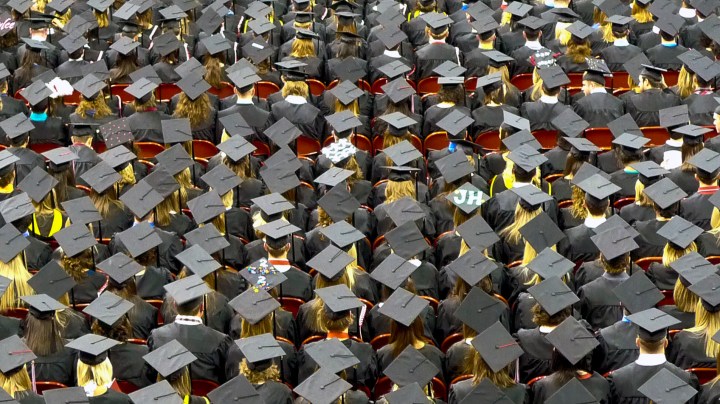How UC Berkeley & UMass Organized Their First Graduations for Undocumented Students

Creative Commons "Graduation Caps” by John Walker is licensed under CC BY 2.0
For the undocumented community, 2017 has been a tumultuous year. And with the introduction of an anti-immigrant administration, even college campuses haven’t been immune to the conversation on immigration that has dominated national discourse. Before Donald Trump assumed the presidency, college students across the country demanded that their schools become sanctuary campuses – which is generally understood as school officials working to keep Immigration and Customs Enforcement (ICE) off school property – to varying results. Now at the end of the school year, students at the University of California, Berkeley and University of Massachusetts Boston pushed for graduation ceremonies specifically meant to honor the accomplishments of undocumented students. As a result, both schools hosted their first undocumented graduations last week.
At Berkeley, the event came together through the efforts of the graduating class and students who belong to Rising Immigrant Scholars Through Education (RISE) in collaboration with the Undocumented Student Program, according to Prerna Lal, a clinical supervisor and immigration attorney for the program and with Berkeley’s East Bay Community Law Center. The Undocumented Student Program – which provides a support system for Berkeley’s undocumented community – began in 2012. The Class of 2017 is the program’s first graduating class. For these three dozen students, the ceremony, which took place on May 14, was important.
“Berkeley is a world-class institution with hundreds of graduation ceremonies that go on for weeks,” Lal told me in an email. “Our students wanted to celebrate the momentous occasion of graduating from this university despite the many challenges and roadblocks they have faced in their lives. [At the ceremony], students and their parents were joyous and visibly moved by the ceremony. There were inspirational messages, tears of joy, and lots of laughter – as is the case at all our events.”
Four days later on the opposite side of the country, undocumented students at UMass held their own graduation ceremony. A few years ago, student Renata B. Teodoro helped found the Immigrant Student Task Force, which opened the lines of communication between professors, university personnel, and students.
“It started because it was incredibly difficult to attend UMass Boston, and it often felt that the administration didn’t know enough about our situation as undocumented students,” Teodoro told me in an email. “We wanted to find ways to create more visibility on campus, and we also wanted to start a merit scholarship that didn’t discriminate based on immigration status. We were able to get approval to start the Tam Tran and Cinthya Felix Immigrant Achievers Scholarship, which is entirely made up of private donations.”
In the midst of taking on this herculean project, Teodoro realized that her graduation – as well as a number of the undocumented students she knew –was quickly approaching. So she set out to organize the UndocuGrad Celebration. She requested a space and then began reaching out to other undocumented students. “It became clear that people really liked the idea,” Renata said. “We started trying to figure out how we could get some money for at the very minimum food. We requested money from Student Senate, Alumni Association, and Office of Diversity and Inclusion. Also, one of the professors on the Task Force committed to buying us stoles and a couple of us put in some of our own money for decorations.”
After the election, spaces that welcome undocumented populations have become even more necessary. In a year that has spawned heightened fear, these two graduations allowed undocumented students to celebrate and tell their stories in the best way they saw fit.
S
E “Many of us who [graduated made] it through tremendous obstacles,” Renata added. “[Me] and another student had been separated from our parents because of this immigration system, and we knew they wouldn’t be at our graduation. Others had to work several jobs or had to stop going to school for awhile, but somehow we found a way to make it and we wanted to tell our story in the hopes that this would motivate others to support the next generation of undocugrads.”
Update, May 25: RISE at Berkeley has held undocumented graduations in the past.